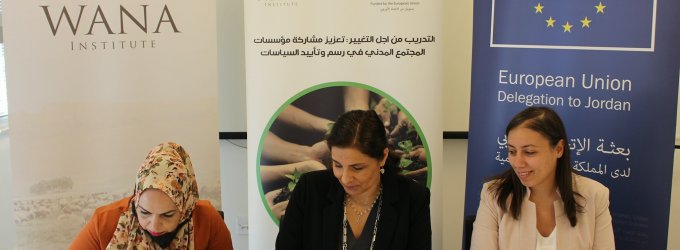-
The WANA Institute Empowering Civil Society to Advocate ...
The WANA Institute Empowering Civil Society to Advocate for Environmental Sustainability
Amman, Jordan – Six Community-Based Organisations (CBOs) received financial awards worth £150,000 to implement projects to enhance the role of local communities -in the southern and northern governorates- in addressing environmental issues. The projects are funded by the European Union in Jordan and supported by the West Asia-North Africa Institute (WANA) which signed the agreements with the six CBOs. This activity is part of a two-year EU funded project Training for Change: Empowering CBOs to Advocate Policies implemented by the WANA Institute in partnership with Intermediaries Change Center for Sustainable Development (ICC) in Ajloun and Al-Khansa for Social Development in Tafileh.
The financial awards were distributed to implement solutions devised by the community-based organisations in order to tackle pressing environmental issues such as water resource management, waste management, and food security. Each of these issues will require harnessing the necessary technical, administrative, and financial skills, which will be developed throughout the two-year duration of the project. The first year of the project entails training to assess the local needs, devising solutions, composing financial aid proposals, data and information analysis, and quantitative and qualitative research methodologies. Whereas, the second year of the project will oversee the reviewal of the proposals and monitoring the implementation of the solutions devised during the first year. Accordingly, six problems have been identified and the organisations have put forward relevant solutions. To enhance water resource management, the relevant governorates must implement the following three suggestions: use recycled water from taps around the house, increase awareness to the issue of water scarcity in Jordan, and install tap devices that save water. In terms of solid waste management, the three R’s must be implemented: reduce, recycle, and reuse. Lastly, to mitigate food security, the groups in Al-Mafraq suggest using hydroponic planting because it is efficient as it ensures perfect and controlled conditions for food growth. As for the Karak governorate, the group suggested planting home gardens to promote self-sufficiency in food growth.
The project aimed to empower CBOs with knowledge of international environmental agreements, as well as the local environmental policies, challenges and opportunities facing Jordanians. The WANA Institute provided community-based organisations with the necessary skills to develop practical solutions for environmental issues. The project manager, Dr. Majd Al-Naber stated that “investing in our local community, and capacitating and engaging these organisations is a necessity to mitigate the environmental challenges facing Jordan. Building the community’s environmental ownership, leadership, and responsibility can be enhanced through providing them with the right tools and skills to disseminate the acquired information to the rest of society, this is what we are trying to achieve through this project”.
Director of Programme at WANA Ms. Shereen Shaheen indicated that CBOs in Jordan play an important role in protecting the environment. Thus, to ensure a clean environment their voices and involvement need to be at the decision-making table.
https://euneighbours.eu/en/south/stay-informed/news/eu-jordan-rewards-si...

